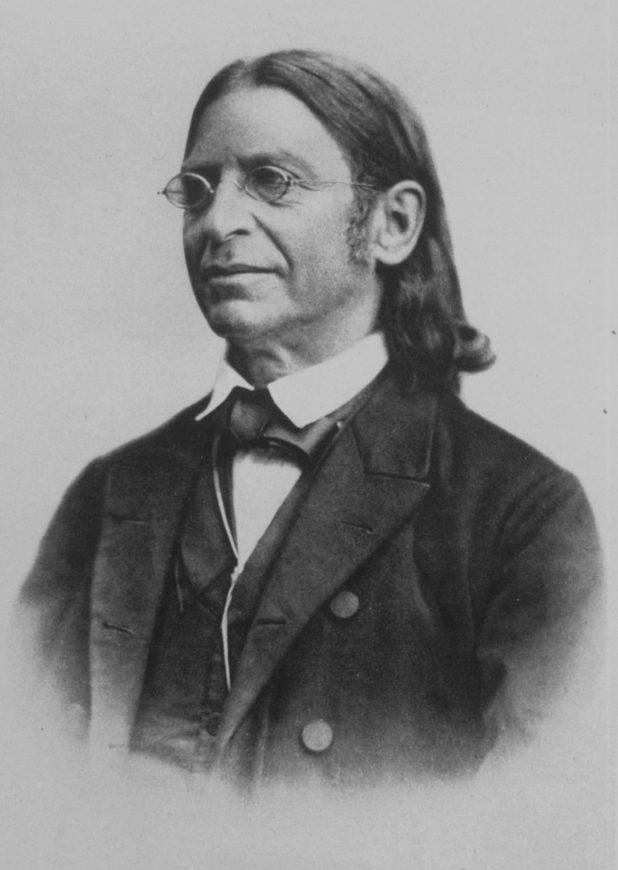Diversity Macht Frei
February 19, 2017
Abraham Geiger is best known as the founder of Reform Judaism, one of the major strains of Judaism in the world today. He also did pioneering scholarly research into the similarities between Judaism and Islam, arguing that Islam was not an authentically separate religion but rather a minor variant of Judaism. Later, Geiger made somewhat similar derogatory claims about Christianity, arguing that it was merely an evolution of Pharisaic Judaism. His work then can be viewed as an early instance of the now familiar strand of Jewish supremacist scholarship, in which Jewish scholars argue that some seemingly impressive non-Jewish achievement in fact “owes it all to the Jews”. Appropriately enough, given Geiger’s elaboration of the similarities between Judaism and Islam, Muslims have been known to make similar supremacist claims.
In various works, including the one I quote here – “From Mitteleuropa to the Middle East: Orientalism through a Jewish Lens”, The Jewish Quarterly Review, Vol. 94, No. 3 (Summer, 2004) -, (((John M. Efron))) has promoted the notion of a Jewish Orientalism, arising particularly in 19th century Germany. He sees the work of the Jewish Orientalists as being characterised by the following considerations.
(1) the desire of Jewish Orientalists for Jewish civil equality through emancipation;
(2) their rejection (often virulent) of Orthodox Judaism;
(3) their antipathy to Christianity; and
(4) their Islamophilia which saw them tirelessly promote the idea of a genuine Muslim-Jewish symbiosis
Abraham Geiger was one of these Jewish Orientalists who pioneered the sympathetic representation of Islam in the west. He also made ready use of the technique that is still the principal tool of Jewish dialectic even today: invalidating another person’s point of view by attributing to them an impure emotional state.
Another of Geiger’s innovations, one that bespeaks a particular German Jewish Orientalism, is the great respect he accorded to Muhammad and Islam, a respect rarely paid by Gentile Orientalists. While the Enlightenment saw the beginnings of a more positive representation of Islam and its founder, many scholars continued to dismiss Muhammad as a hypocrite and deceiver, as Voltaire had done, or they concurred with Herder, who called the prophet a “fanatic,” while still others agreed with the great nineteenth-century Semiticist, Theodor Noeldeke, who diagnosed him as “hysterical.” Geiger declared such opinions to be the product of “outright bias and misunderstanding of the human heart”. By contrast, Geiger saw Muhammad as a “genuine enthusiast who was himself convinced of his divine mission, and to whom the union of all religions appeared necessary for the welfare of mankind.”
According to Geiger, Mohammed did not even intend to create a new religion. His belief system was basically Judaism modified here and there in places where it could not otherwise accommodate his own megalomania.
Because he sought to assert the foundational nature of Judaism, Geiger denied that Muhammad had created a new religion. Rather, he “was in favor of borrowing from earlier religions. He desired no peculiarity, no new religion which should oppose all that had gone before”. … So although a new religion did emerge, that was not Muhammad’s initial intent; rather, it was to incorporate Jews into “his kingdom of the faithful upon earth”.
Geiger was among the first to promote the idealised image of Islamic Spain, the supposed paradise of tolerance and learning, which he liked to compare unfavourably with Christian civilisation.
…for Geiger, the indissoluble links that bound Judaism and Islam together stood in marked contrast to the breach birth that characterized the origins of relations between Christianity and Judaism. Echoing the dictum of his German Jewish contemporary, the novelist Berthold Auerbach, who claimed that the barometer of a country’s morality was the way it treated its Jews, Geiger spoke highly of Arabia, for “it was very favorable to the Jews, who had fled to that country in large numbers after the destruction of Jerusalem, inasmuch as it enabled them to gather together and maintain their independence” (p. 7). In fact, thirty years later, in an essay on the medieval Hebrew poet Judah haLevi, Geiger expanded upon the idea that Judaism flourished under Islam, claiming that it “survived and took root in those countries which long before had produced the first fruits of civilization: Egypt, Phoenicia, Syria, Assyria and Babylonia.” While it was also later influenced by Parsiism and Hellenism, “it developed its own fullest potential in closest union with Arab civilization.”
Geiger noted that Judaism principally flourished among the Arabs where it did not stand in religious contention with the majority. As with most scholars of the Wissenschaft des Judentums school, Geiger looked beyond Arabia to Jewish life in Muslim Spain as an example of Jewish communal and cultural efflorescence and integration into the larger society. There, according to Geiger, Arab and Jewish culture were both intimately related and intertwined as Hebrew became Arabized and Arabic aesthetics became Judaized and even the deepest of Jewish religious writings were produced in Arabic.
…he detected an admirable form of Judaism in the medieval Jewish culture that flourished under Islam in the Iberian Peninsula, one that differed markedly from that which emerged in Central and Eastern Europe. While he saw both Eastern Europe and the Orient as “culturally deficient,” Geiger emphasized, with obvious disapproval, the state of Judaism in Poland, which was charac- terized by “the new growth and further degeneration that is Hasidism.” While he recognized the impact of persecution in medieval France and Germany on Jewish intellectual life, Rashi notwithstanding, Geiger at- tributed much of the blame for what he regarded as the low level of early modern Polish Jewish culture to the generally anti-intellectual climate fostered by Christianity.
In contrast, the Islamic environment of Spain gave rise to Jews whom Geiger described as “heroes of Wissenschaft.” Their worldly poets, authors, and religious thinkers, especially those who wrote in Arabic (perhaps an oblique reference to his stance that German and not Hebrew should be the language of Jewish liturgy), were ideal role models for the Jews of Germany.
Geiger was animated by a fierce animus towards Christianity, which, for the most part, he took pains to disguise.
In fact, because Geiger was committed to a comparativist approach, his positive evaluation of Islam was to a great extent conditioned by his attitude toward Christianity, an attitude that hardened over time. In a letter of 1865 to his friend, the Gottingen mathematician Moritz Stern, Geiger bitterly declared, “I may be mistaken about many things but I am not mistaken when I view Christianity as the adversary of great cultural endeavor. Christianity takes great pains to reveal the full extent of its intolerance; the papal encyclicals and the spoutings of the High Consisto- ries, the synods and the Church Days truly contribute their fair share in this effort.”‘ Three years later, in 1868, Geiger compared the tolerance of the Muslim state that “admitted both Jews and Christians” with the exclusionary practices of Europe, claiming that not only were Catholic and Protestant clergy guilty of fomenting Jew hatred but that “even the nonbelievers cannot refrain from spouting invective against Jews and Judaism, simply because this hatred has been inculcated into their hearts by Christianity.”‘
Geiger also pioneered another now distressingly familiar Jewish technique of seeking to place a ban on those deemed to have an insufficiently favourable attitude towards Jews.
In the wake of intensifying anti-Semitism after 1871, Geiger spoke out against his detractors and his scholarship became more stridently anti- Christian. But Geiger the historian was especially stung by German bibli- cal scholarship, which was replete with anti-Semitism and bolstered by a sincere belief in Christian supersessionism. In 1872, he wrote to the lead- ing German Orientalist, Theodor Noldeke, complaining of the treatment of Jewish sources at the hands of Christian bible scholars. He assured Noldeke that Jewish scholars were not trying to dictate what the re- search agenda or methodological approach of Christians should be but “we do have the right to denounce the ignorance of those who, despite such ignorance, and with boundless arrogance and spite, air their deroga- tory opinions on such matters; and we are justified in banning such per- sons from the company of fair and honest scholars.”
In Germany there is now a rabbinic seminary called the Abraham Geiger College. Every 2 years it offers an Abraham Geiger Award which “recognizes contributions to Judaism in its many facets” and “honors people who rendered outstanding service to pluralism.”
In 2015, the recipient of the award was Angela Merkel.
 Daily Stormer The Most Censored Publication in History
Daily Stormer The Most Censored Publication in History



